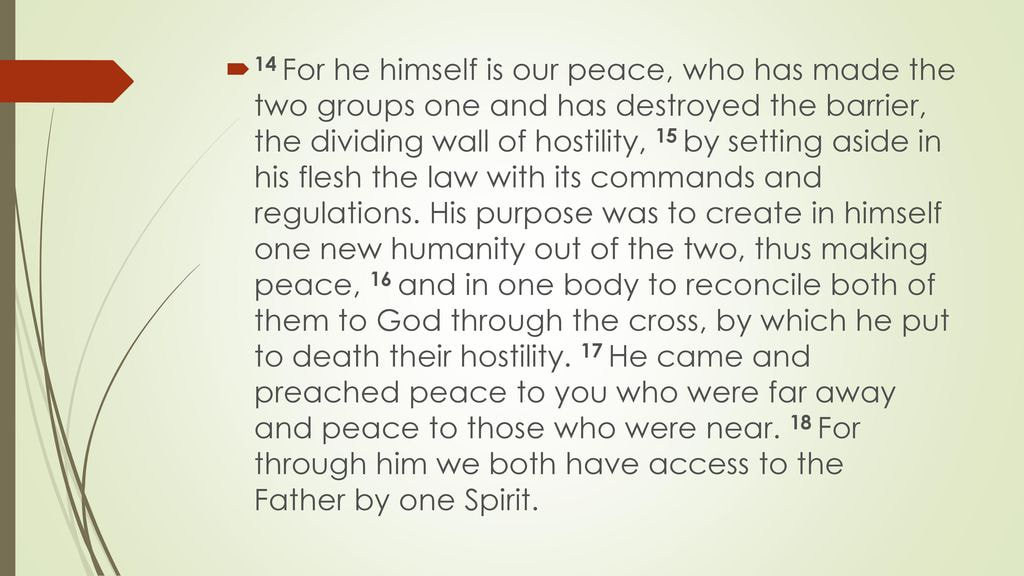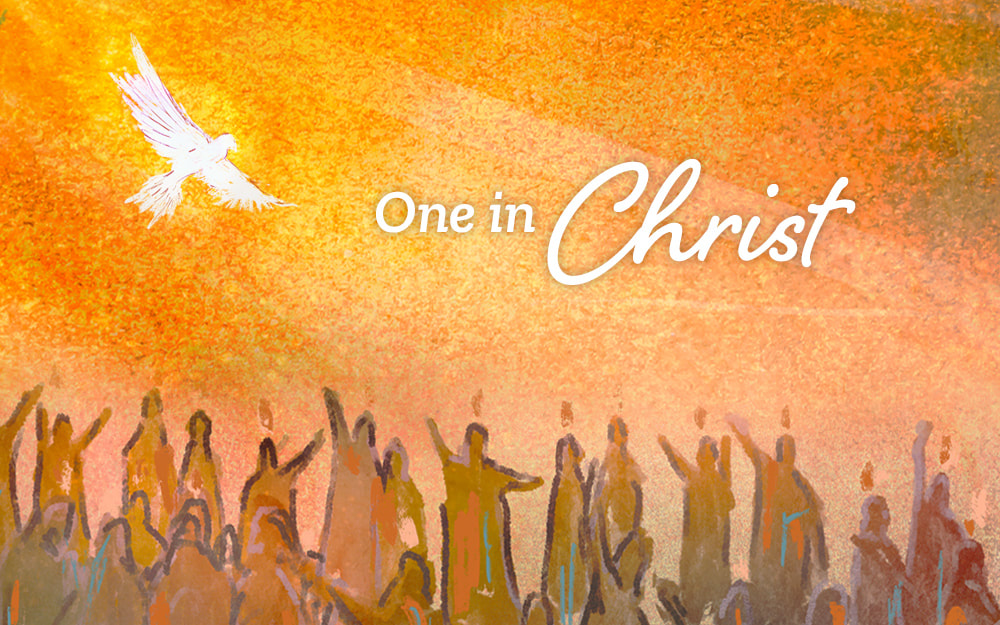
Ephesians 2:15b-16, “His purpose was to create in himself one new humanity out of the two, thus making peace, and in one body to reconcile both of them to God through the cross, by which he put to death their hostility.”
When Paul mentions creating one new humanity of the two, he is talking about Jews and non-Jews coming to Christ. Their identity as Jews or Gentiles becomes secondary to their identity in Christ. What shapes your identity and what shapes the perceptions you have of others? In our congregations we don’t have an issue with the Jewish/Gentile divide but we have been conditioned to see each other through a racialized lens. We see each other as white, black, Asian, Latino, Native American.
The biblical worldview is the only antidote to identity politics. Intersectionality erodes the bedrock of civil society and dismantles decorum precisely because it is predicated and upon differences. It will only tolerate and celebrate divergence and divisiveness. The Christian worldview, however, offers a powerful response to identity politics. The biblical reply does not deny the reality nor the importance of identities to the human story. It does, however, begin with what unites all humanity—the Imago Dei. The biblical worldview starts in sameness not differences. It grounds the value of an individual in something more transcendent than experience, background, race, or gender; it starts with the image of God that resides in every human being on the planet. Humanity stands united by virtue of our common descent from Adam and Eve. Christians, therefore, do not reject identity politics and intersectionality merely because of its failure as an ideology, but because it denies the common bond that beats in the heart of every human: we are all made in God’s image. That identity is precious, perennial, and most to be cherished.
By the way, this issue helps to underline why biblically committed Christians must point again and again to the common descent of all humanity from Adam and Eve. We all share the same first parents. Modern evolutionary theory denies the very possibility of common descent from a single couple. Ideas have consequences.
Christians must understand and hold fast to the image of God that unites humanity in a common identity. The most important identity for every human is not our own self-prescribed definition based upon their experiences and background, but the identity given to them by the God of the universe. That identity trumps everything else.
Additionally, the biblical argument is not drawn only from Genesis. It reaches not only into the truths of Genesis, but the glories of the New Covenant of redemption inaugurated by Christ. Jesus Christ is creating a new humanity—a people not of this world but of heaven, a people for God’s pleasure. It is a people made up of every tribe, tongue, people, and language—a citizenry of every ethnicity and race, of every socio-economic background and culture. Its citizenship does not stand on its differences but on our common salvation in Christ. In Christ we find our true identity. Believers in Christ share an eternal and glorious unity in Jesus Christ the Lord—a unity we enter upon faith in Jesus’s perfect sacrifice and atonement for sin.
Intersectionality and identity politics breed division. These ideologies atomize society and drive humanity away from its core and essential commonality. This is where Christians must counter with the gospel of Jesus Christ and the authority of Scripture. Only the gospel secures peace and establishes truth. Only the gospel will unite a fractured society. Only the gospel can stem the tide of modernity’s downward spiral into chaos and decay. Identity politics is bad enough in the culture. In the church, it denies the gospel altogether.
Of this, I am certain: At the marriage supper of the Lamb, no one will hold any kind of sign claiming their own identity.
On June 12, 1987, President Ronald Reagan stood at Brandenburg Gate at a ceremony commemorating the 750th anniversary of the City of Berlin. In his speech he uttered some of the most famous words every said by an American President, “Mr. Gorvacbev, Tear Down This Wall!” That Wall, which began to come down in November of 1989, tells a deeper story about the nature of humanity: humans are willing to divide themselves over any issue. There is something in our hearts that causes us to divide ourselves and erect walls to protect our identity. This division can be manifested in different ways: social, racial, economic, political, and even theological.
In Ephesians 2:14-18 the Apostle Paul argues against such division, primarily concerning the issue of race. In the context, Paul is speaking about the deep rift between Jews and Gentiles. The division that extends all the way back into the Old Testament. These two ethnic groups, who once hated each other, are now one in Christ. Paul describes how Christ has broken down the wall of separation and has reconciled both groups together. The issue at hand is a hard one but a very pressing issue.
The cross has spiritual implications (Ephesians 2:1-10) and social implications (Ephesians 2:11-22)
In the larger context, Paul shows that the death of Jesus both has spiritual and social implications. In verses 2:1-10 the text demonstrates that we are reconciled to God by faith. This logically leads Paul to discuss the social implications of the death of Jesus in verses 11-22. For this article, I want to focus primarily on verses 14-18 of the text and show a few ways this impact those in Christ.
Jesus Has One People
It’s important to realize when we talk about the social implications of the gospel that we don’t miss the gospel. Paul makes clear that in order to be reconciled to each other that we first must be reconciled to God (v. 13). Those who were far from God are now brought near through the death of Jesus. His substitutionary work subsequently changes the way we view the people of God now. The Bible claims that the two groups (Jews and Gentiles) are now one and Christ has torn down the dividing wall of hostility.
This means that the two groups of Jews and Gentiles in Christ are now one because Christ Himself has torn down the very things that seek to divide them. So practically for us, we may not experience hostile Jew and Gentile tensions, but we do experience division as it is related to race. In Christ, we are no longer divided based on race, culture, or ethnicity; rather we are one in Christ. This means that there is no hostility but peace. The reason why, “He is our peace.” Jesus is the One who creates peace between fallen people like you and me.
One New Humanity
Since Jesus has One New people, He has broken down the wall that divides them. The “wall” in context is referring to the “the law consisting of commands and expressed in regulations.” Paul probably has in mind the identity markers of Israel such as circumcision, food laws, and the Sabbath. The very things that would make a Jew, a Jew. However, in Christ, those identity markers have been torn down! For Paul, his identity was not found in him being Jewish but in Christ.
This means that in Christ, He has redefined the people of God. To be included into the people of God is not a matter of social or ethnic identity. Rather it is a matter of identity in Christ. This means that anything that divides people has to be broken down by Jesus. Paul does not mean that race, ethnicity, or cultural heritage are not important. Actually to the contrary. Even as a follower of Jesus, Paul still maintained some of his Jewish culture. But those things don’t define God’s people. The people of God are a beautiful mosaic of different people, languages, nations, and tribes. And Paul’s point is that Jesus Christ has created One New Humanity. As Diognetus argued, Christians are a “New Race.”
Reconciled into One Body
Paul further argues that reconciliation has happened through the cross of Jesus Christ which has resulted in one body. Reconciliation is the removal of animosity and the acceptance as equals. This one body language could mean the church body or Christ’s bloody body. I personal understand the phrase to mean that through the One body of Jesus (bloody body), He has now reconciled us into One Body (the Church) John Piper says:
That is what God is aiming at in our salvation: a new people (one new man) that is so free from enmity and so united in truth and peace that God himself is there for our joy and for his glory forever. That’s the aim of reconciliation: a place for God to live among us and make himself known and enjoyed forever and ever.
The death of Jesus reconciles us to each other. We are created for each other, and we need each other. We are part of the people of God that does not divide itself over issues of race, ethnicity, or culture. Rather we are reconciled, brought into friendly relationship, with each other by the death of Jesus.
Christ Preached Peace
Paul grounds his argument by saying that Jesus Himself preached peace. I believe this is referring to both peace with God and with each other. Through the death of Jesus, we now have peace with God (Romans 5:1), which results in peace with each other. I’m convinced this is our message. We don’t preach peace for the sake of unity and harmony. We preach peace, as Jesus did, in order to people would experience peace with God that results in peace with each other.
Access to Spirit and Father
Lastly, Paul seeks to prove that these two groups, now made one through Jesus Christ, have access to God by the Spirit. It is by the Spirit that the existence in the realities of the New Humanity can occur. The Spirit Himself provides the access needed to be in proper relationship to God. As one New Humanity brought about by the death of Jesus and applied to us by the Spirit, we can experience complete access to God’s grace, mercy, and peace. We do this in unity together because of the work of Jesus.
Christ has come to break down the spiritual and social Berlin Walls in our lives. Christ died to make us one in Him. His death accomplished more than just a personal relationship with God. It provided a way to have relationship with each other. This text is a call to unity. We must forsake those things that divide us whether they are racial barriers, cultural concerns, or ethnic division. We have to cast of those identity markers that divide the church. Our identity as the people of God is not based on any social, racial, or political identity. Rather it is based on Christ.
Now realize: we are not color blind, and we should not pretend that race doesn’t matter. Rather the church must be on the frontlines of discussing the issue of race by proclaiming peace! And peace is only found in Christ. We must know that God in Christ by means of His Spirit is calling fallen humanity into a New Humanity – the church which is made up of many races, languages, tribes, and people.

 RSS Feed
RSS Feed
























































